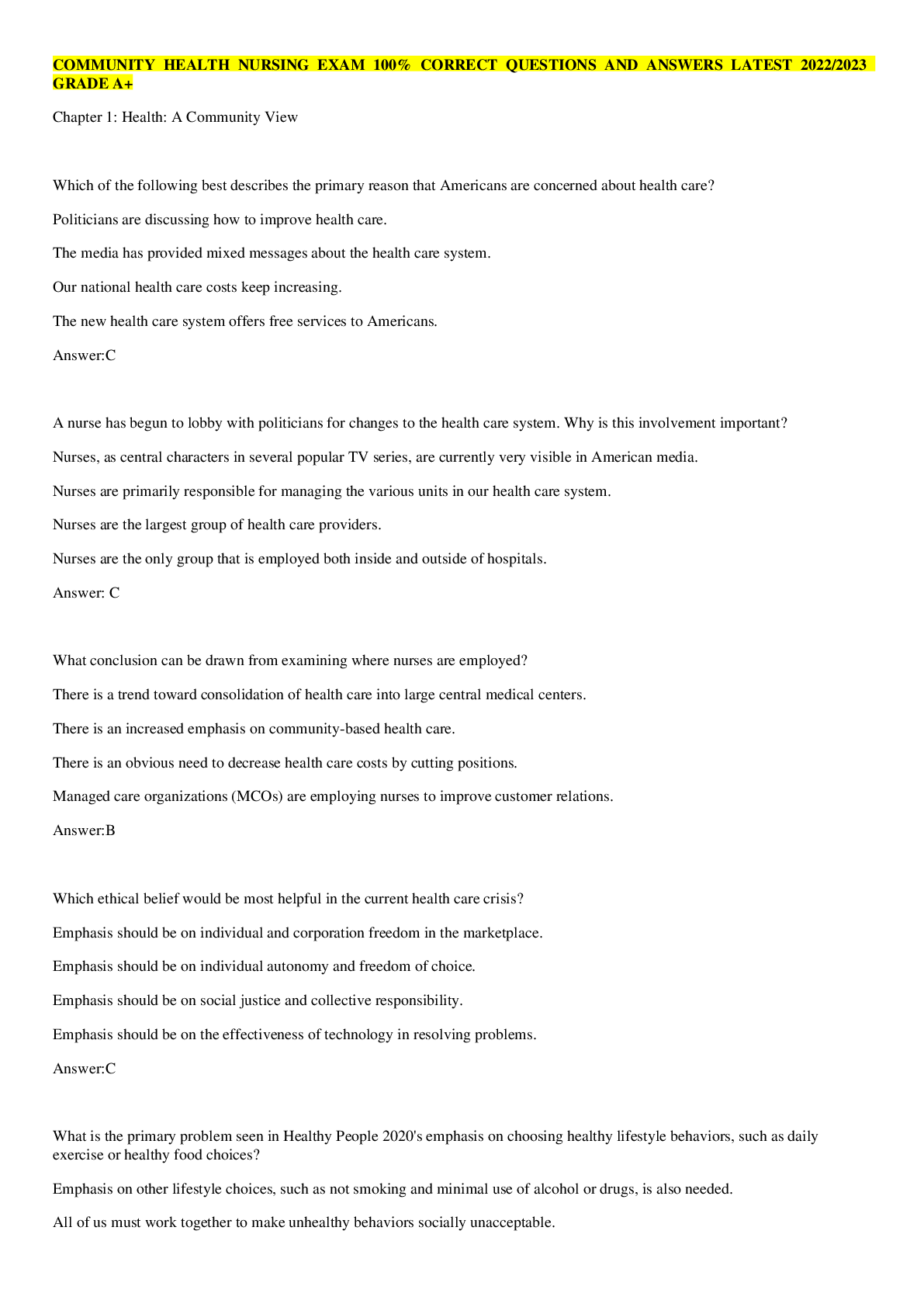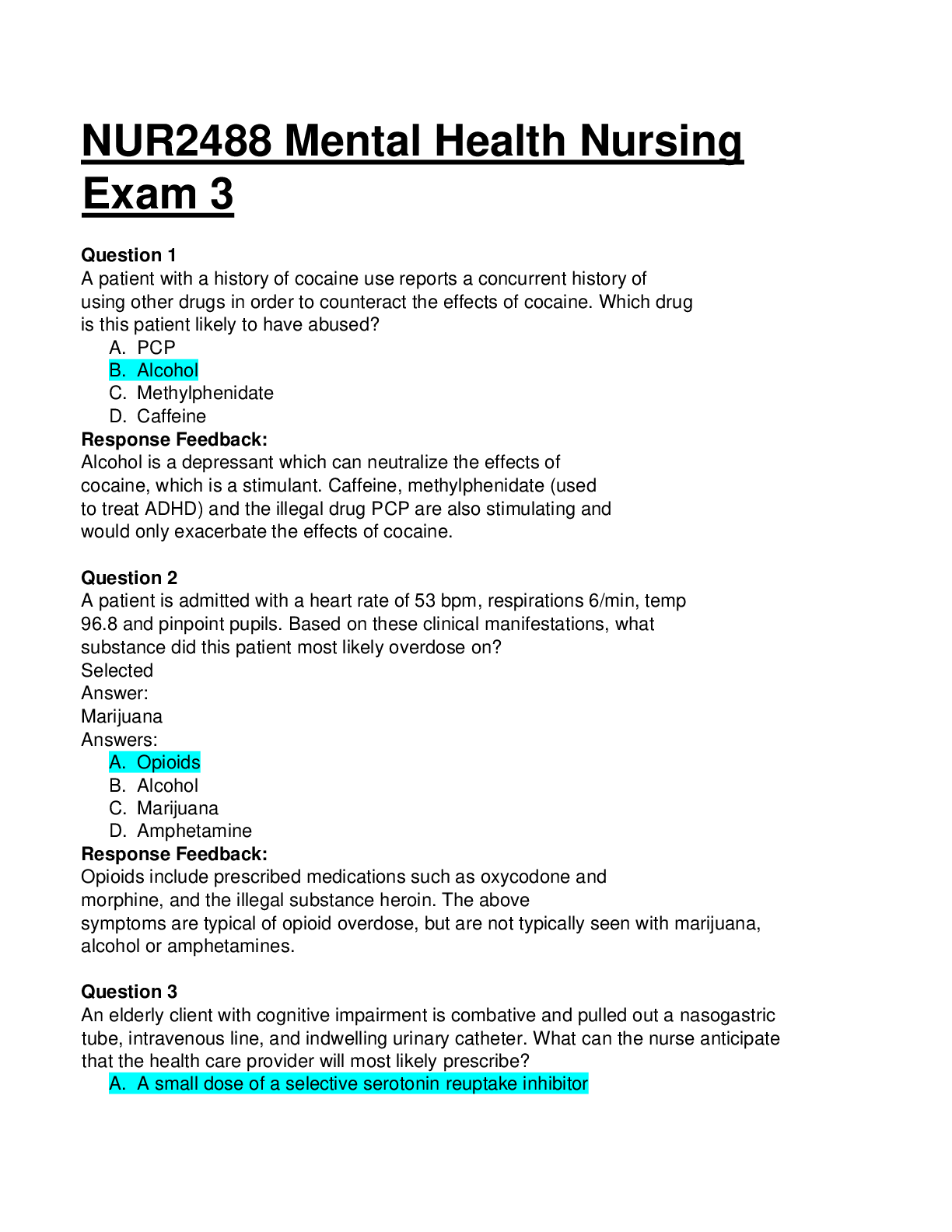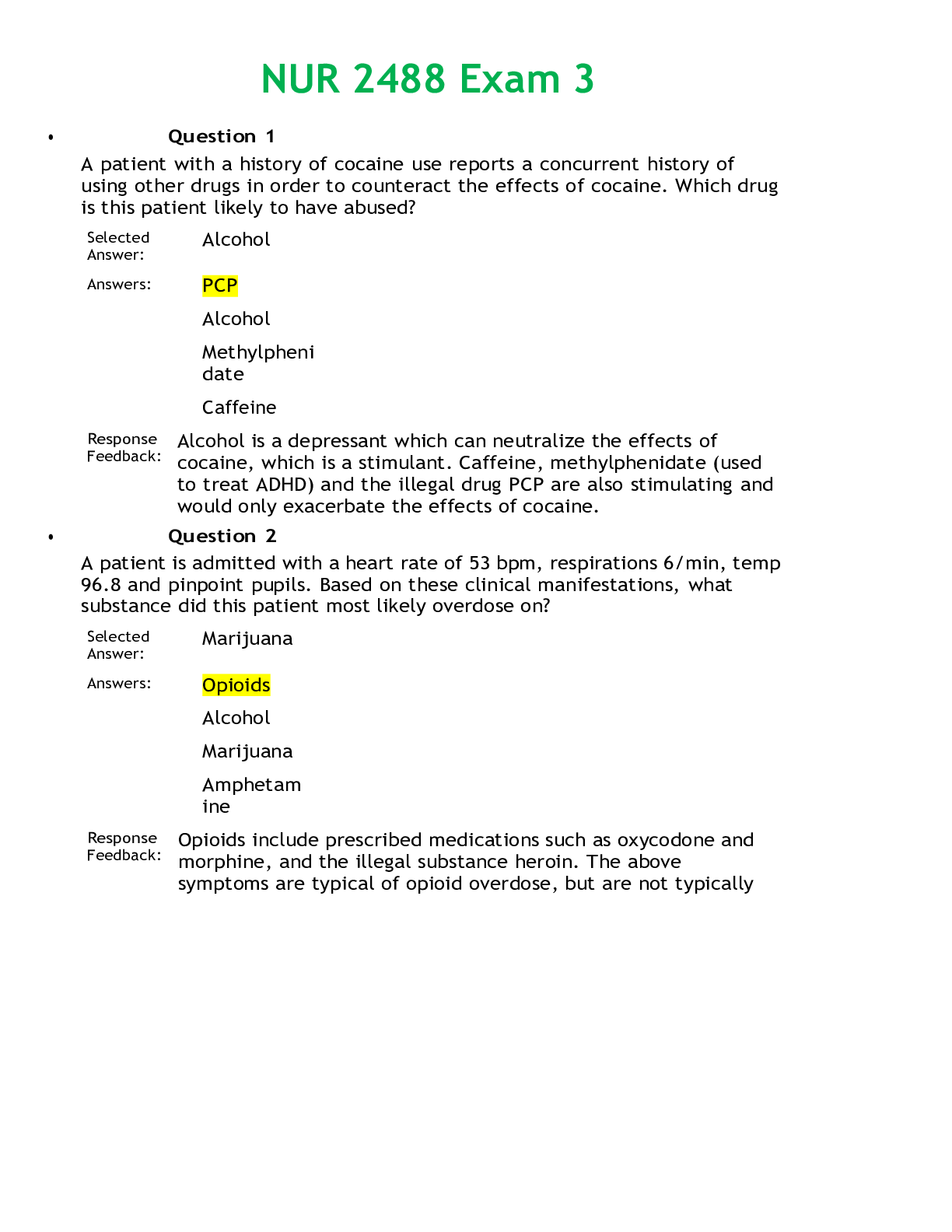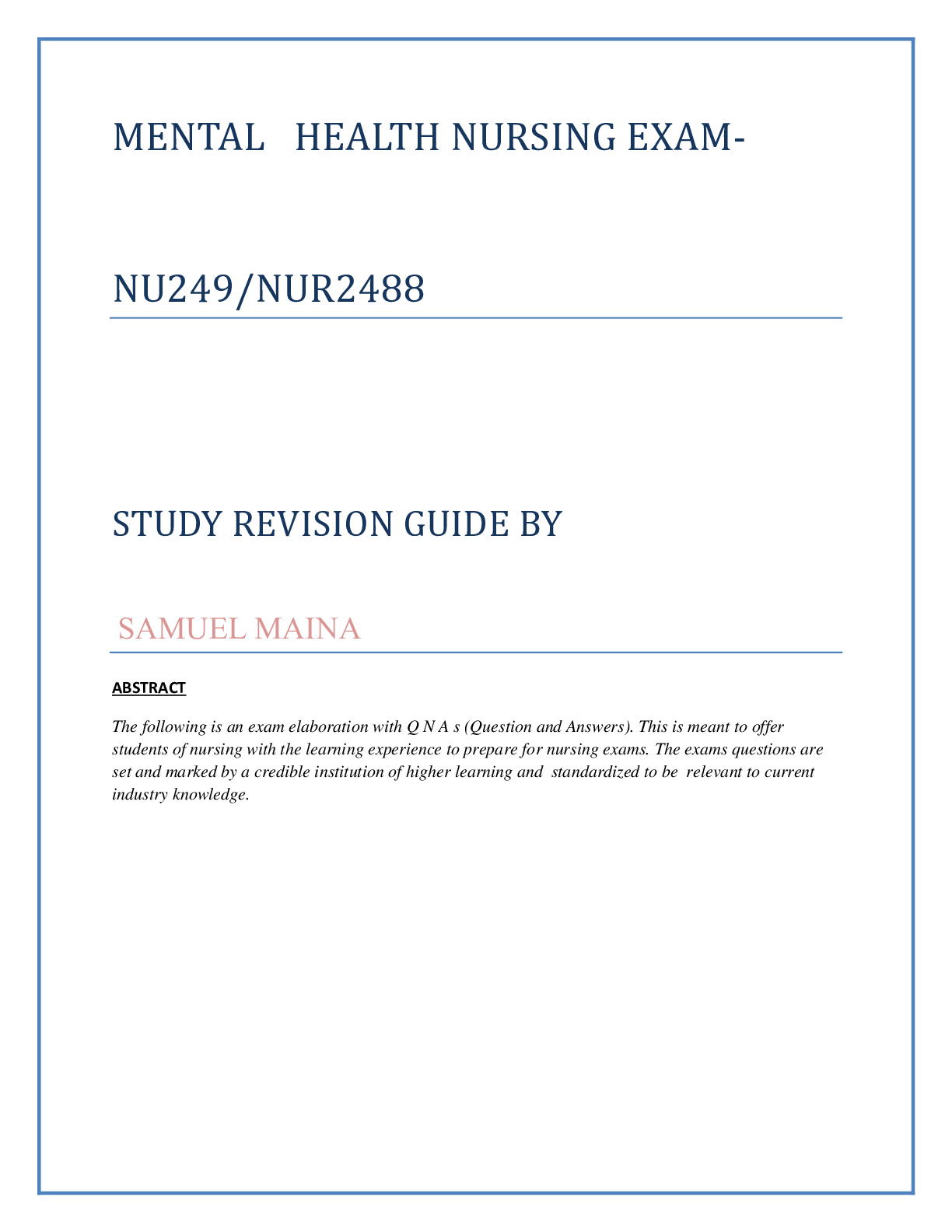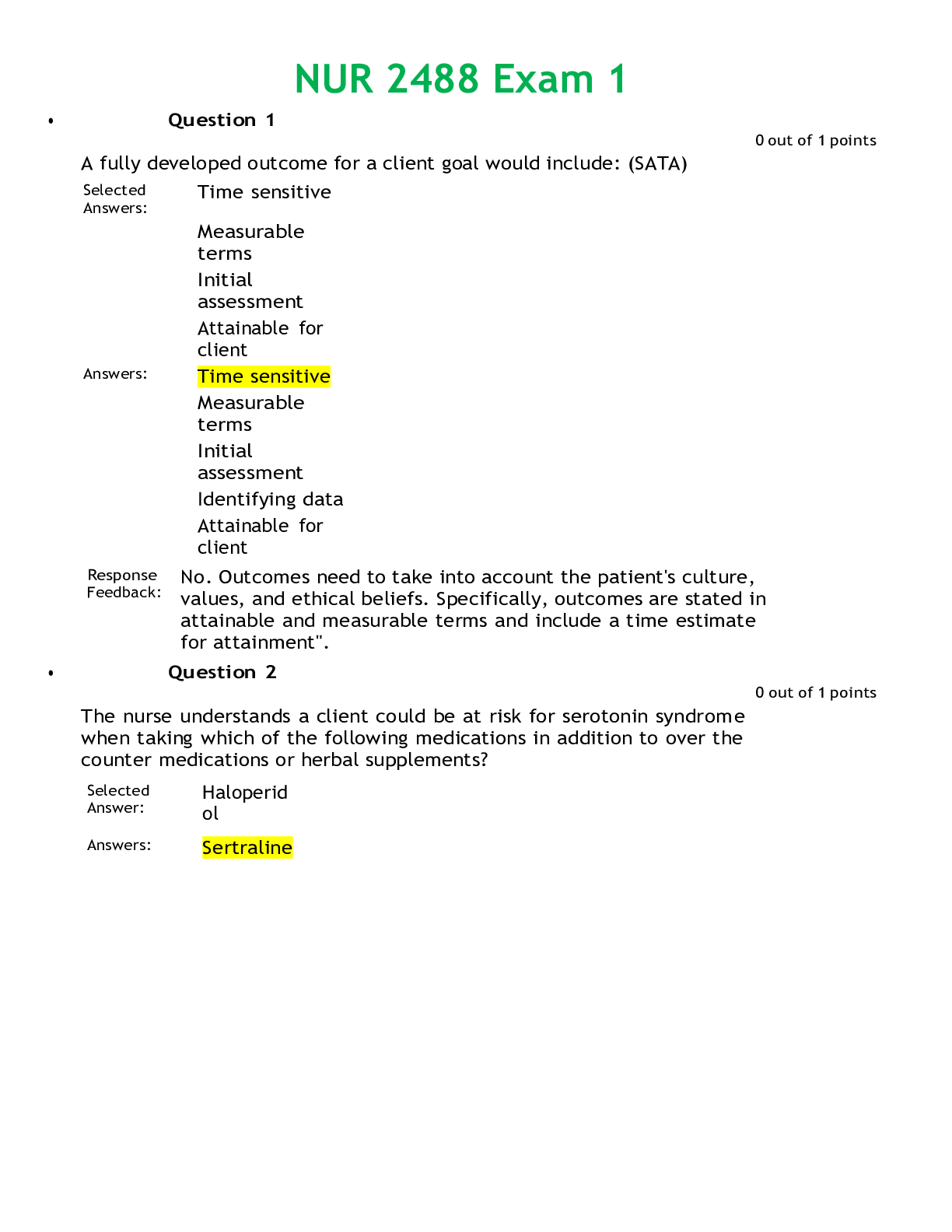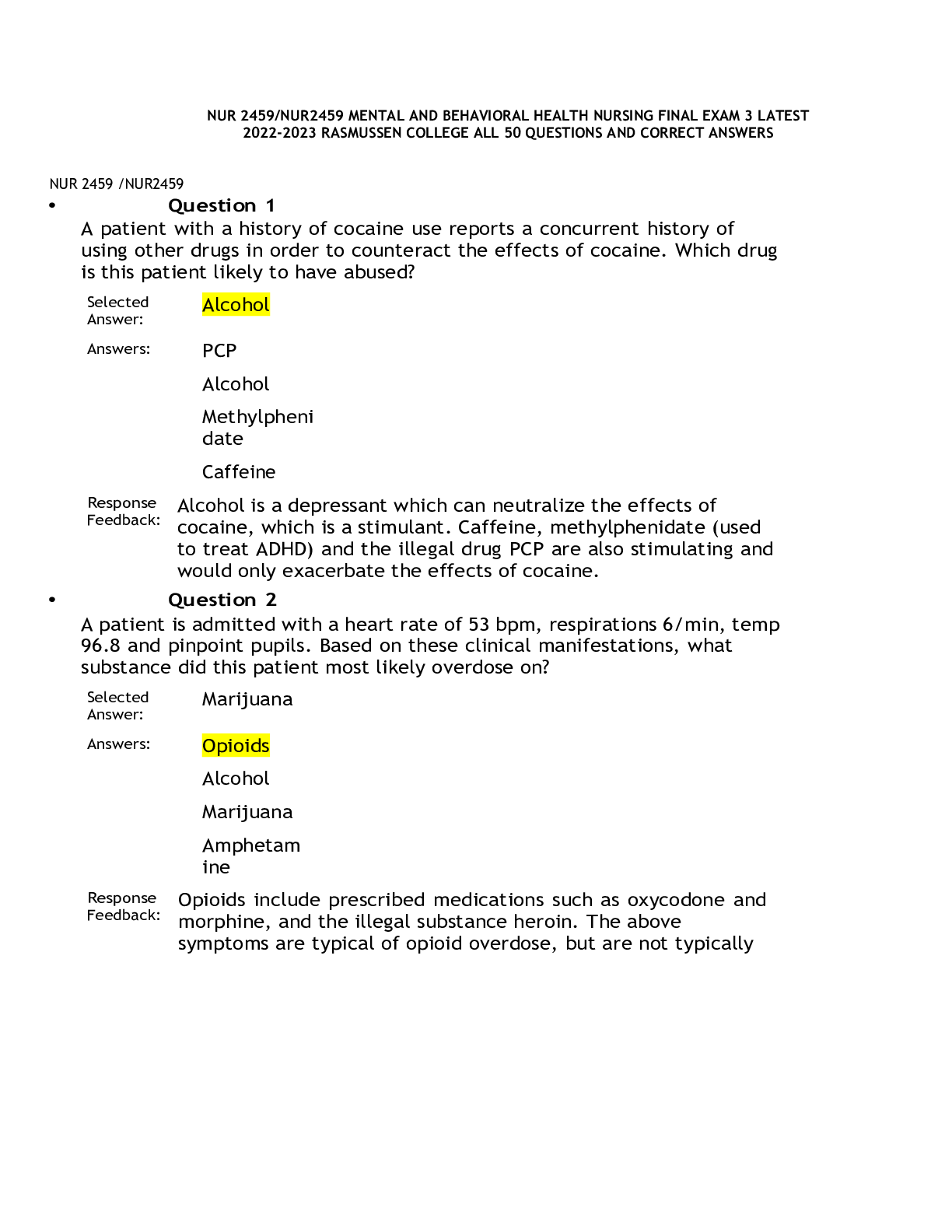*NURSING > QUESTIONS & ANSWERS > NUR2488 Mental Health Nursing Exam 3 (50 VERIFIED ANSWERS) ALREADY UPDATED. (All)
NUR2488 Mental Health Nursing Exam 3 (50 VERIFIED ANSWERS) ALREADY UPDATED.
Document Content and Description Below
NUR2488 Mental Health Nursing Exam 3 • Question 1 A patient with a history of cocaine use reports a concurrent history of using other drugs in order to counteract the effects of cocaine. Which dr... ug is this patient likely to have abused? Answers : Response Feedback: PCP Alcohol Methylphenidate Caffeine Alcohol is a depressant which can neutralize the effects of cocaine, which is a stimulant. Caffeine, methylphenidate (used to treat ADHD) and the illegal drug PCP are also stimulating and would only exacerbate the effects of cocaine. • Question 2 A patient is admitted with a heart rate of 53 bpm, respirations 6/min, temp 96.8 and pinpoint pupils. Based on these clinical manifestations, what substance did this patient most likely overdose on? Answers : Response Feedback: Opioids Alcohol Marijuana Amphetamine Opioids include prescribed medications such as oxycodone and morphine, and the illegal substance heroin. The above symptoms are typical of opioid overdose, but are not typically seen with marijuana, alcohol or amphetamines. • Question 3 An elderly client with cognitive impairment is combative and pulled out a nasogastric tube, intravenous line, and indwelling urinary catheter. What can the nurse anticipate that the health care provider will most likely prescribe? Answers: A small dose of a selective serotonin reuptake inhibitor A large dose of a benzodiazepine l Response Feedback: A maintenance dose of buspirone A small dose of an atypical antipsychotic Aggressive behavior can be safely managed by antipsychotic medication. Initial dosing should be small and raised cautiously until behavior is controlled. Selective serotonin reuptake inhibitors are not indicated for aggressive behavior. If a benzodiazepine is used, the initial dose should be low. Buspirone is not effective if given on an as-needed basis. It is administered in small divided doses daily to control agitation. • Question 4 A nursing care plan contains the intervention “monitor for complications of refeeding syndrome.” Which body system should a nurse most closely monitor for clinical manifestations of dysfunction? Answers : Response Feedback: Renal Central nervous Endocrine Cardiovascular Refeeding resulting in too-rapid weight gain can overwhelm the heart, resulting in cardiovascular collapse; thus focused assessment becomes a necessity to ensure patient physiological integrity. The other body systems are not initially involved in the refeeding syndrome. • Question 5 Which of the following is the best example of all-or-nothing thinking, a common cognitive distortion of patients with an eating disorder? Answers : “If I gain any weight, I’ll keep going until I’m huge.” “When people tell me I’m looking better, they really mean I’m fatter.” “No one likes me because I’m fat.” “When I’m thin, I’m perfect.” Response In all-or-nothing thinking, the person cannot see any middle ground between l Feedback: extremes; a person with an eating disorder will see themselves as either thin or immense. The other comments are common in eating disorders but are not examples of all-or-nothing thinking. • Question 6 A nurse reports to the interdisciplinary team that a patient with an antisocial personality disorder lies to other patients, verbally abuses a patient with Alzheimer’s disease, and flatters the primary nurse. This patient is detached and superficial during counseling sessions. Which behavior most clearly warrants limit setting? Answers : Response Feedback: Lying to other patients Flattering the nurse Verbal abuse of another patient Detached superficiality during counseling Limits must be set in areas in which the patient’s behavior affects the rights of others. Limiting verbal abuse of another patient is a priority intervention. The other concerns should be addressed during therapeutic encounters. • Question 7 Which of the following are primary characteristics of a person with borderline personality disorder? Answers : Response Feedback: Demonstrates flexibility and compromise Demonstrates socially appropriate behaviors Demonstrates eagerness to learn new coping skills Demonstrated a self-defeating cycle of behavior A self-defeating cycle of behavior is a hallmark of borderline personality disorder, creating difficulties is work, social and family relationships. Individuals with a borderline personality are inflexible and do not compromise easily. Socially inappropriate behavior is common in borderline personality, as is an unwillingness to change and learn new coping skills • Question 8 A nurse is working with a patient with a histrionic personality disorder. Which of the [Show More]
Last updated: 1 year ago
Preview 1 out of 25 pages
Instant download
 ALREADY GRADED A (1).png)
Buy this document to get the full access instantly
Instant Download Access after purchase
Add to cartInstant download
Reviews( 0 )
Document information
Connected school, study & course
About the document
Uploaded On
Nov 10, 2022
Number of pages
25
Written in
Additional information
This document has been written for:
Uploaded
Nov 10, 2022
Downloads
0
Views
73

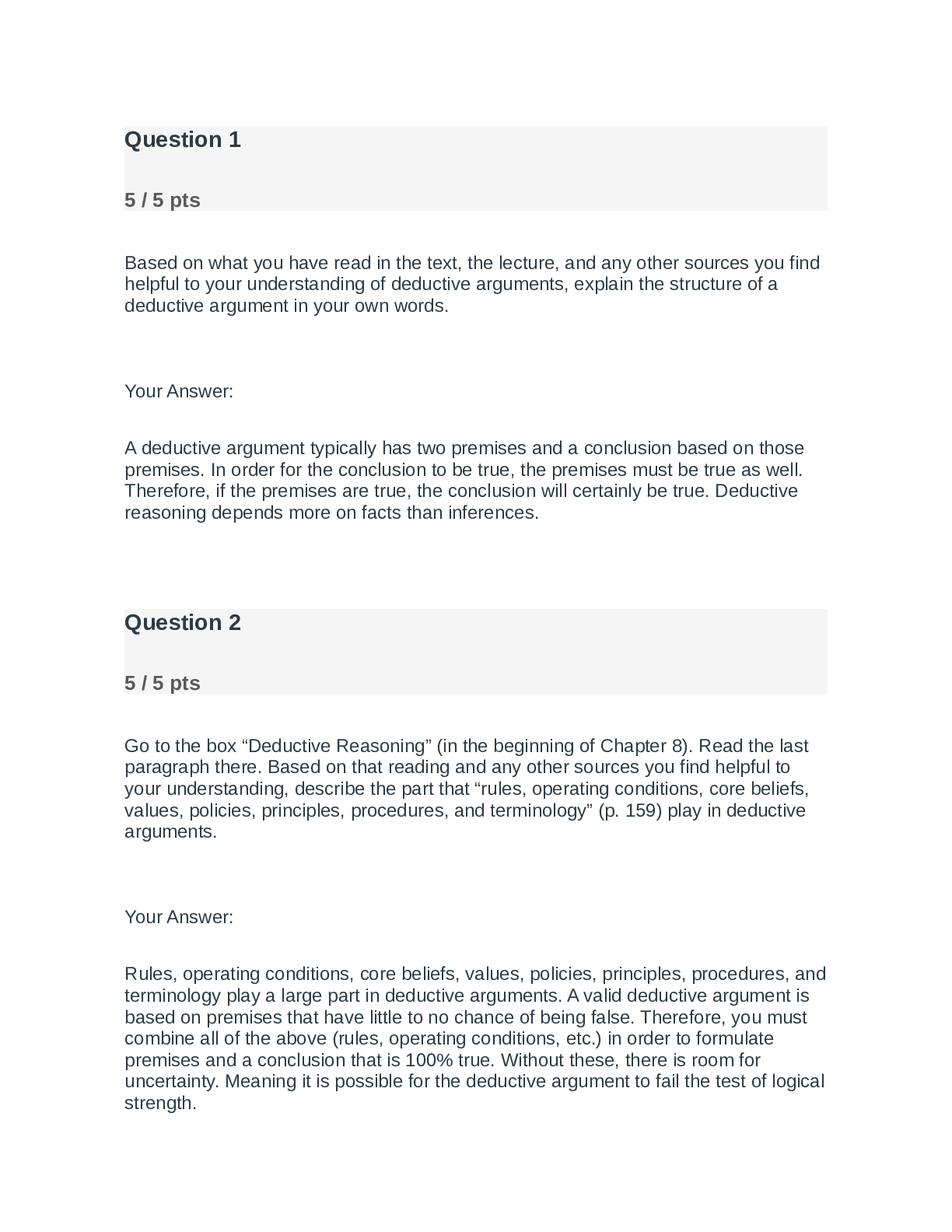
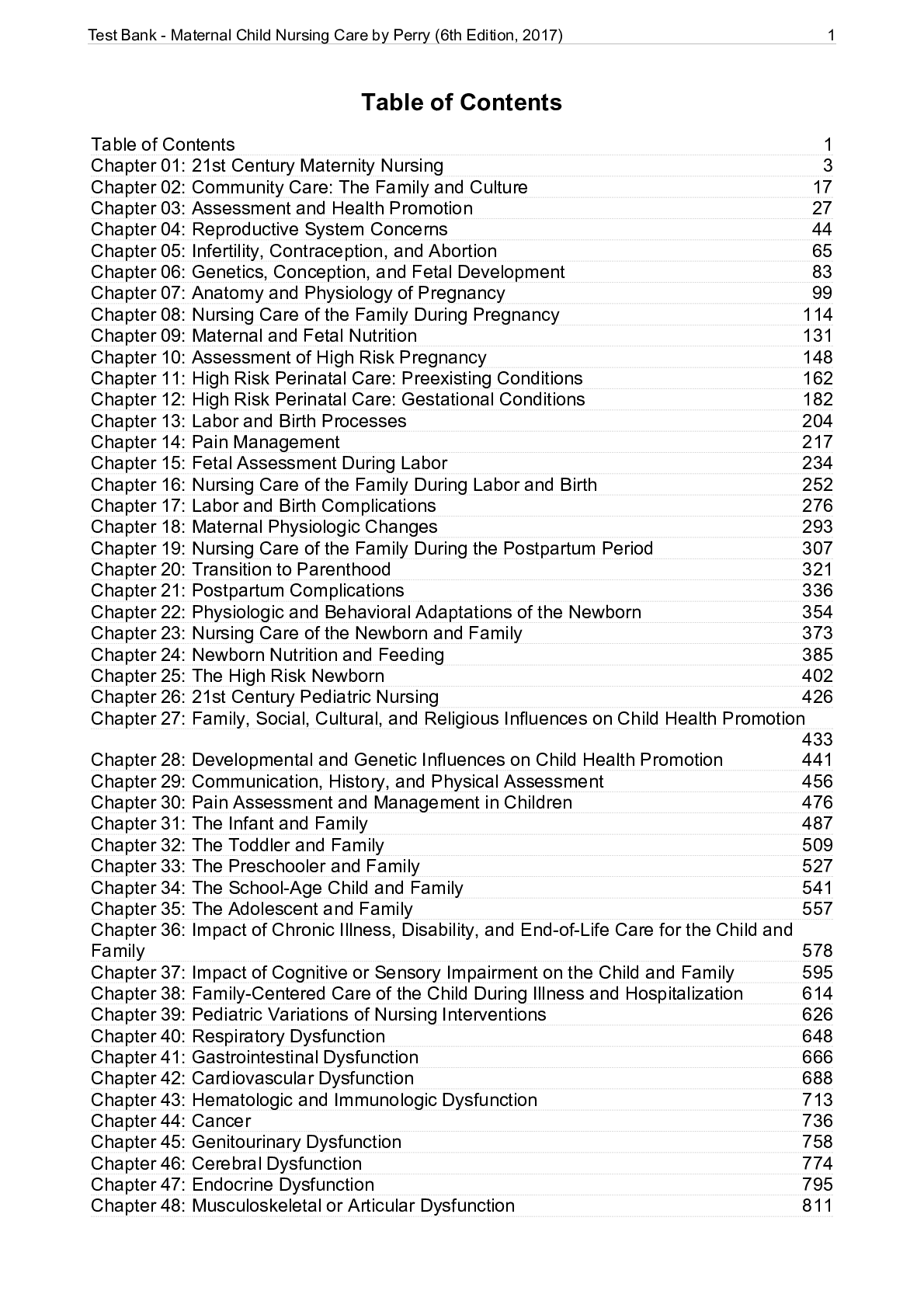

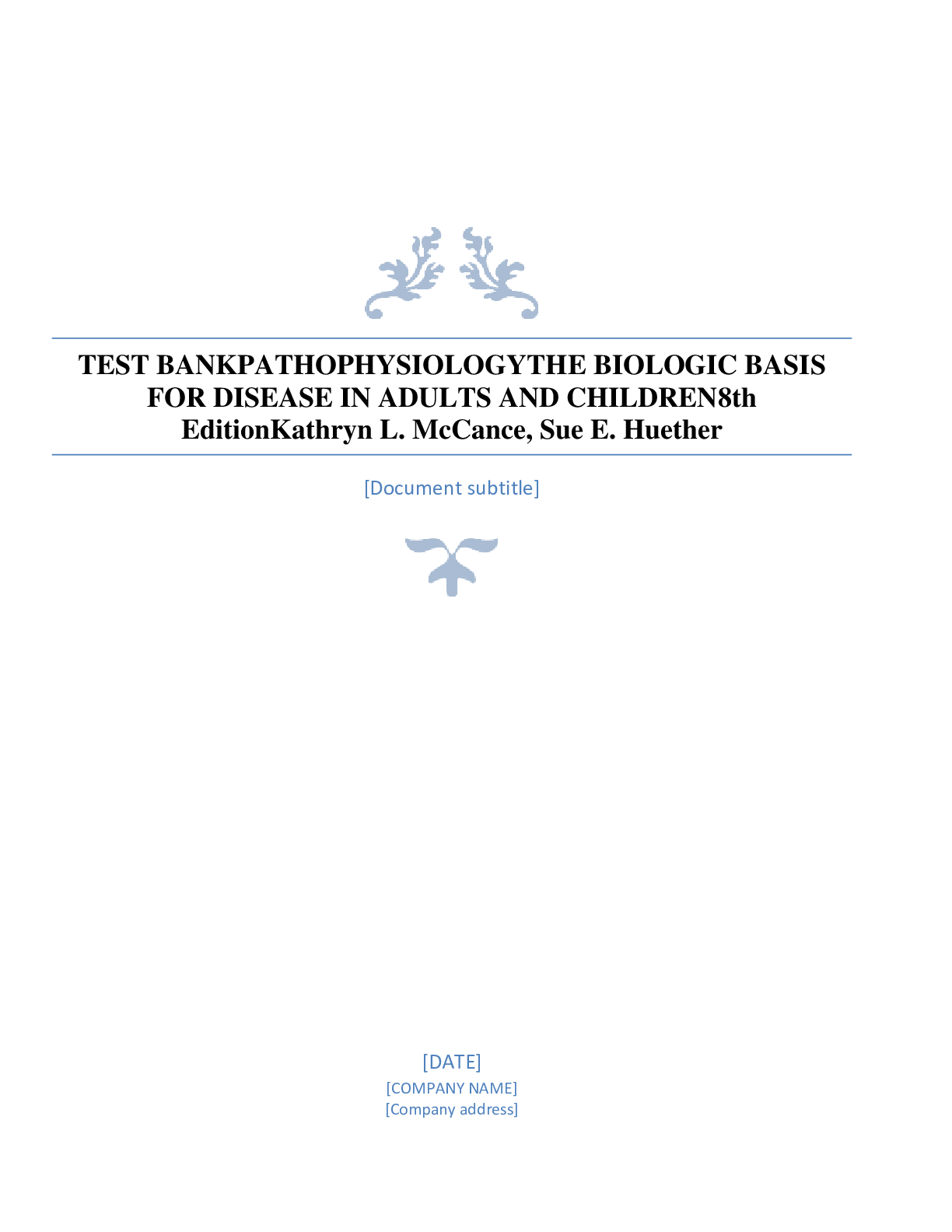

.png)
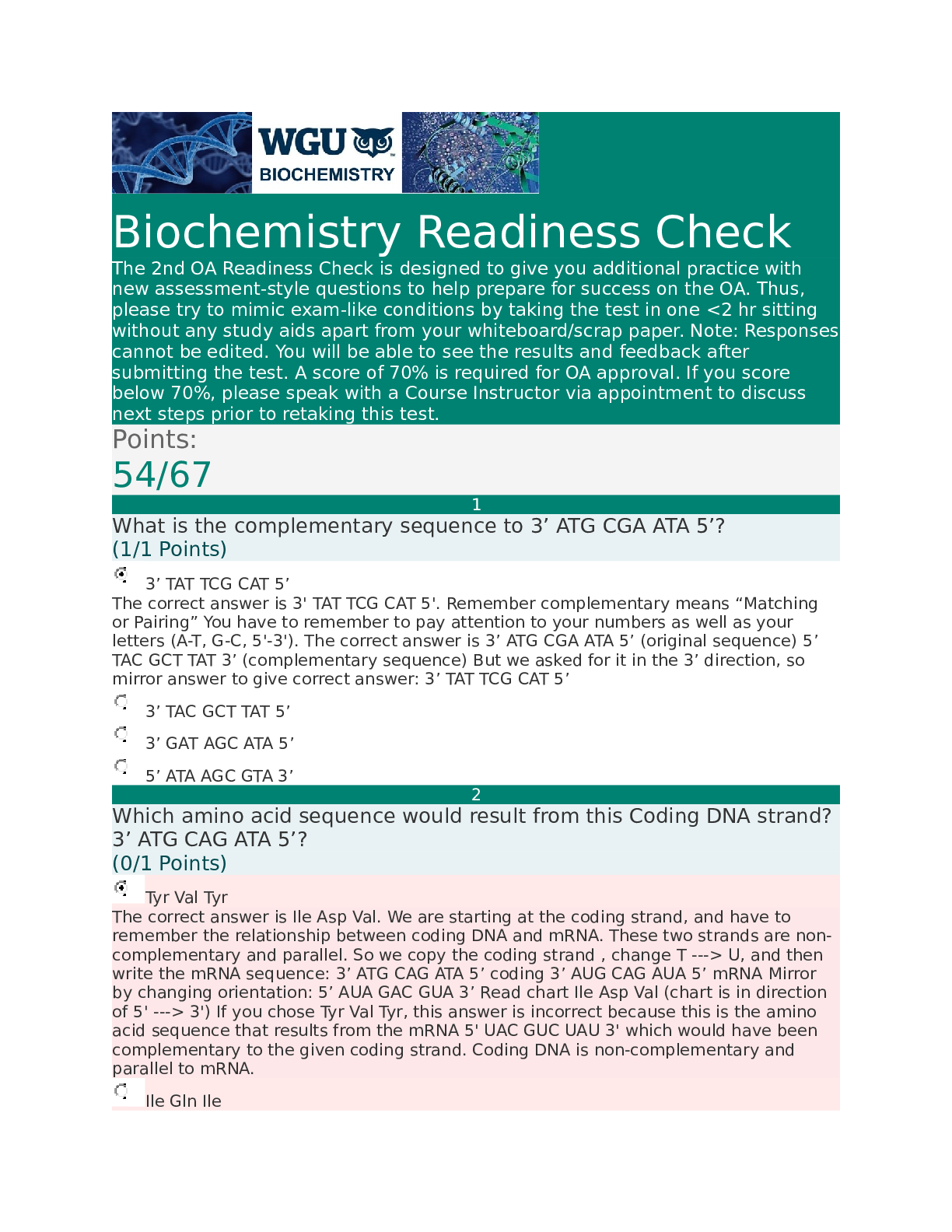
.png)
.png)
.png)

.png)

